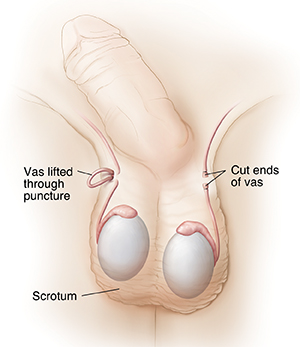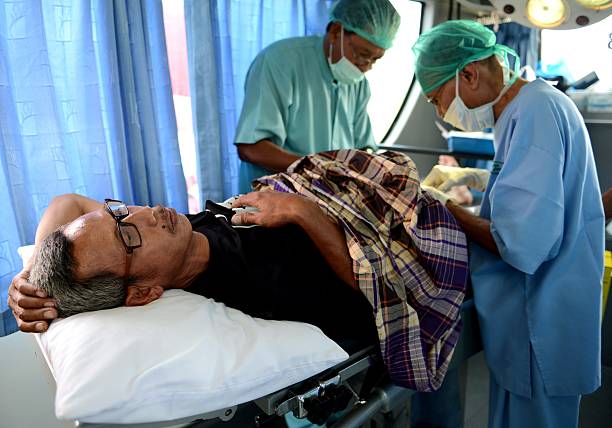If you're considering a vasectomy, there are several steps and factors to think about before, during, and after the procedure. Here’s what you can expect:
Before the Procedure
Consultation and Decision-Making: First, you'll meet with a doctor, usually a urologist, who will discuss the procedure with you. They’ll want to know about your medical history, any potential risks, and your reasons for wanting a vasectomy. It’s important to be clear about your decision, as a vasectomy is often considered permanent, though reversals are sometimes possible but not guaranteed.
Pre-Procedure Instructions: Your doctor may ask you to avoid taking certain medications, like blood thinners, in the days leading up to the surgery. You'll also likely be instructed to shave or trim the hair around the scrotum before the appointment.
Mental Prep: Some people find the idea of the procedure nerve-wracking. If you feel anxious, talk to your doctor about what’s worrying you. Many clinics can offer a mild sedative or local anesthesia to ease any discomfort.
Types of vasectomies
A vasectomy is typically a quick and relatively simple outpatient procedure. There are two main types of vasectomy:
- Conventional Vasectomy: The doctor makes one or two small incisions in the scrotum to access the vas deferens (the tubes that carry sperm). The tubes are cut, tied, or sealed to prevent sperm from mixing with semen.
- No-Scalpel No-Needle Vasectomy: This method is less invasive. The doctor makes a tiny puncture in the skin of the scrotum rather than an incision. The Vas Deferens are then removed, cut, and sealed. This technique usually results in less bleeding and a quicker recovery.
The procedure itself usually takes about 15-30 minutes and is done under local anesthesia, so you'll be awake but won't feel pain. You may feel some pressure or discomfort, but most men experience minimal pain during the procedure
During the Procedure
The Anesthesia: The procedure is typically done under local anesthesia, which numbs the area but keeps you awake. This means you should not feel pain, though you may feel some pressure or movement.
The Procedure: A vasectomy is relatively quick and can be performed in about 20-30 minutes. The doctor makes small incisions or uses a no-scalpel technique to access the vas deferens (the tubes that carry sperm from the testicles). These tubes are then cut, sealed, or blocked to prevent sperm from entering the semen.
Comfort: You’ll likely be asked to relax in a reclined position, and the area will be cleaned and sterilized. Most people don’t experience intense pain during the procedure, though some might feel mild discomfort or pressure. You may be able to chat with the doctor or listen to music during the process, helping to ease the tension.
After the Procedure
Recovery Time: The recovery for a vasectomy is usually quick—many people return to normal activities within a few days. You’ll need to avoid strenuous activities, heavy lifting, or sexual activity for a week or so to allow the area to heal.
Discomfort and Side Effects: After the procedure, you might experience some swelling, bruising, or mild discomfort in the scrotum area. Ice packs and over-the-counter pain relievers can help manage any soreness.
Follow-Up: About a week or two later, you’ll have a follow-up appointment to check on your healing. The most important thing is that you’ll need to provide sperm samples for analysis a few months after the procedure to ensure that there are no sperm in your ejaculate. This is critical because it can take time for all the sperm to clear out. Always Attend the Follow Up Appointments
Long-Term Care: The vast majority of people experience little to no issues after a vasectomy. However, there are some rare complications, like infections or chronic pain (which is uncommon). If you notice anything unusual, make sure to follow up with your doctor.
Lifestyle Considerations
Effect on Sexual Health: A vasectomy should not impact your libido, erectile function, or overall sexual health. It only prevents the release of sperm in your semen, but your body will still produce sperm (they just get reabsorbed).
Long-Term Effectiveness: Vasectomies are considered one of the most effective forms of contraception. However, it’s important to remember that the procedure doesn’t provide immediate contraception, and it can take several months for the sperm to be fully cleared out.
Emotional Impact: While many people are happy with their decision, it’s also natural to have mixed emotions. You might find yourself reflecting on the permanence of the choice, especially if your life circumstances change. It's a good idea to have ongoing conversations with your partner and healthcare provider.
Ultimately, getting a vasectomy is a personal decision with significant benefits for those who feel confident that they don’t want more children. It can provide peace of mind and a sense of control over your reproductive health. And while the process is generally straightforward and well-tolerated, it’s always a good idea to gather information, discuss concerns with a healthcare provider, and ensure it’s the right step for you.
- My brother liked it so much he had it done 3 times! But in all seriousness, it's a minor outpatient medical procedure. He said he's had papercuts that had more and lasting pain. During the healing process it was more discomfort than pain. But don't forget to go for your periodic checkups because it can heal. Just ask my nephews (twins) and niece.
- I've had dentist visits more painful. Felt like some body snapping a rubber band on the base of my penis. I was kind of surprised the process is more on the base than your actual scrotum. Doctor asked me to clear his conscience with me being so young lol. The numbing wears off kind of quick. Couple hours. Then you will be waddling around like a duck for 5-7 days. That's the worst part
- It felt like my balls were smashed with a hammer then ripped from my body with a rusty fish hook! No wait, that was the divorce. The vas was nothing really, mildly uncomfortable for a few days after which aspirin can handle easy enough. Most of it is the building up of trepidation and fear cause someone's gonna stab the boys, but once you get past that part it isn't so awful
- Had mine 3 weeks ago. Slight soreness for the first 6 hours or so. Very little pain at all. I moved a little slower the next few days but that was just me being extra cautious. Ever stretch a rubber band until it breaks? Thats the best way I can describe what I felt during the procedure. You are numbed up so you dont really feel anything but pressure... Piece of cake and quick. Highly recommend.
- It's not that bad. I had about ten (4/10 on the pain scale) instances of pain for ten seconds each. I had it done on a Friday afternoon and I iced my balls until Sunday night.The nurse was gorgeous, but the whole thing is as nonsexual as you can imagine. Plus the room was freezing. She shaved my scrotum because I had not gone short enough when I did it. My wife and I waited a week to have sex. There was no pain at all. We used condoms for twelve weeks. The surgeon needed sperm samples after six and twelve weeks. I still had slight life after the first one, and I've been shooting blanks ever since the second sample. Sex feels more amazing than ever. No regrets. Some doctors may refuse because you're only 29. I will be 40 soon so there was no discussion.
- They told me I did a terrible job shaving and invited a nurse in to shave me. It was pretty funny, she was demonstrating proper ball shaving technique while me, my partner, and the woman performing the vasectomy all watched and provided commentary. It was like a class, but featuring my balls getting shaved. Also I was loaded on valium and xanax so that made things easier to find amusing. I'm still terrible at shaving my balls unfortunately. In my case they used a needle to numb me up, scalpel to slice me open, and of course they cauterized as well so there was that burnt flesh smell. Pain wasn't bad, I spent the next few days hanging out on the couch with some minor aching and was totally fine after that.
- It wasn't too bad, didn't really feel anything through the anesthetic. The recovery period was maybe 3 days, I got it Friday and was back at work Monday. I was in bed watching TV and playing games all weekend. It was slightly uncomfortable at times but nothing awful or unbearable. I'm sure pain tolerance has a lot to do with the recovery period.
- Couldn't have been easier. The only pain is the numbing injections and the ache afterward. Don't forget the frozen peas handy to cool down your gonads and no heavy lifting for a couple of days... Piece of cake and the best thing I ever did. My wife and I decided from the get go that we didn't want kids and this was the safest and most permanent route.




Comments
Post a Comment
Share my thoughts